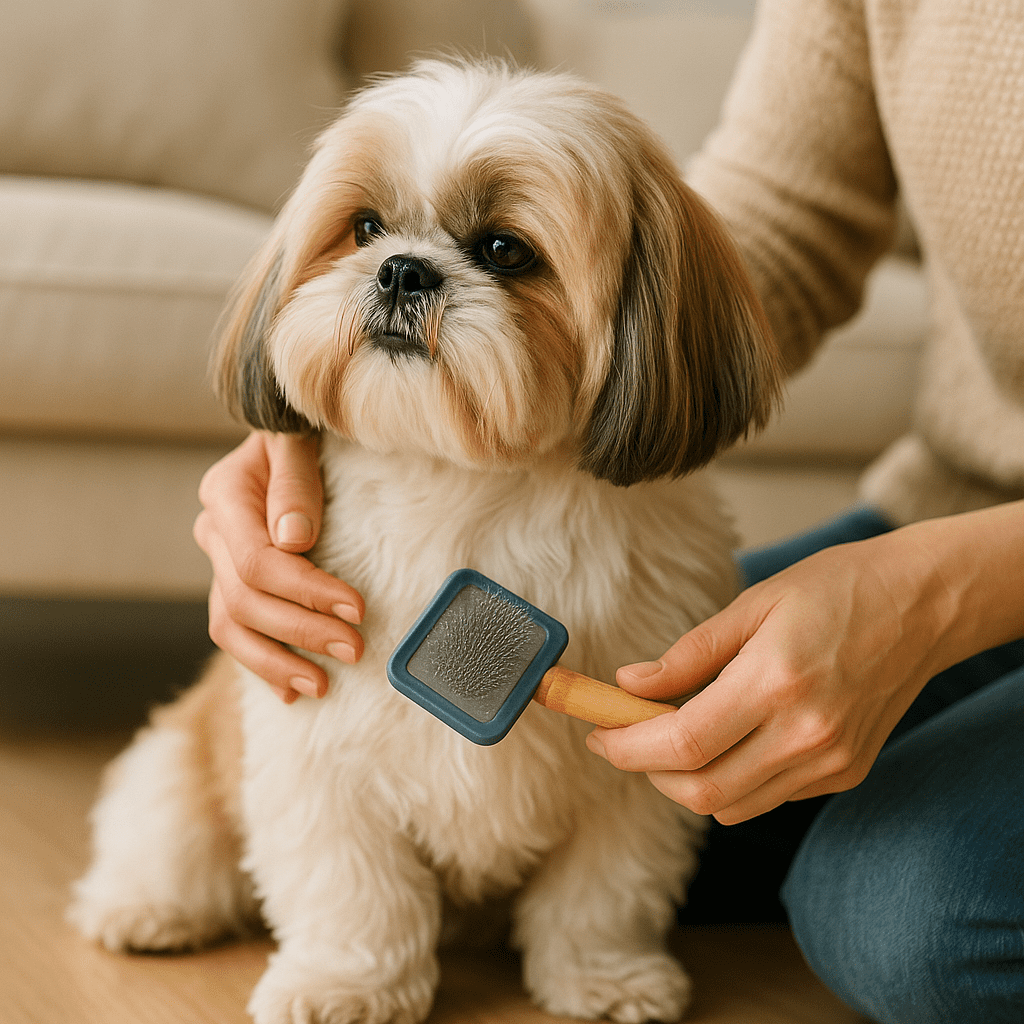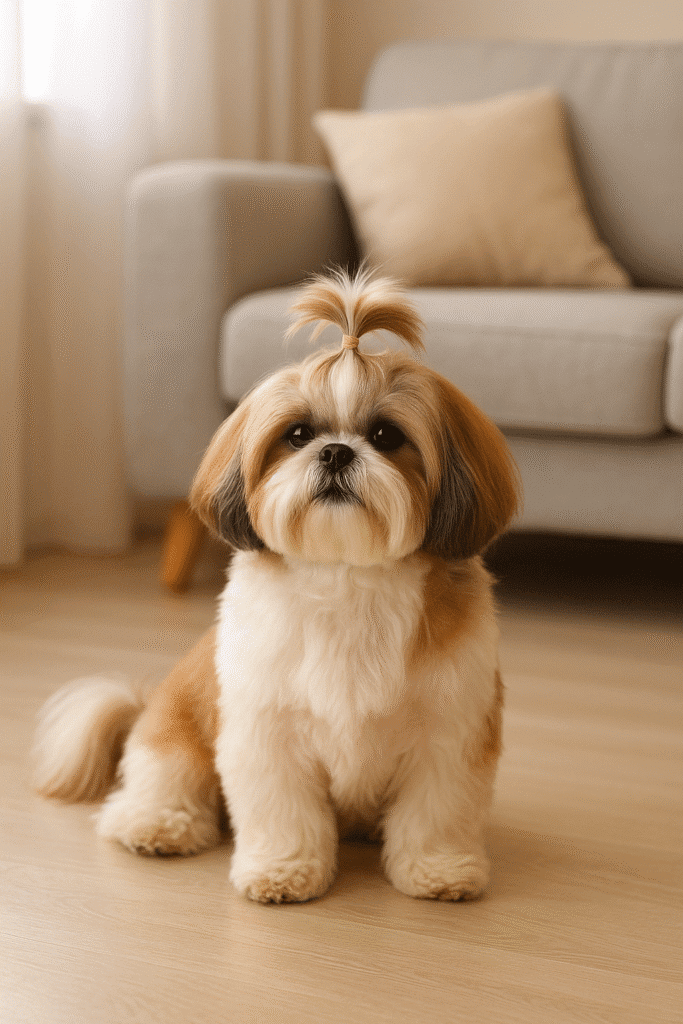Shih Tzu Dogs: Personality, Grooming & Health Care Guide
Summary: The Shih Tzu is a small, affectionate, and loyal companion dog with a royal history. In this complete guide, you’ll discover their personality traits, grooming essentials, common health concerns, and expert care tips to ensure your Shih Tzu lives a happy and healthy life.
Introduction
The Shih Tzu, often called the “Lion Dog,” is one of the most beloved small dog breeds in the world. Known for its charming appearance, flowing coat, and affectionate nature, this breed has won the hearts of families for centuries. Originally bred as a royal lap dog in China, the Shih Tzu continues to shine as a devoted companion in modern households. In this guide, we’ll explore the unique traits of the Shih Tzu, how to care for its grooming and health, and practical tips for training and bonding.

Shih Tzu Personality Traits
Shih Tzus are well-known for their loving and gentle temperament. Unlike some toy breeds that can be nervous or overly energetic, Shih Tzus tend to be calm and adaptable. They thrive in family environments and get along well with children and other pets.
Affectionate Companions
One of the breed’s most defining traits is its love for people. Shih Tzus often seek closeness with their owners, enjoying time on laps or simply following them around the house. This makes them excellent therapy dogs and perfect for individuals looking for an emotional support companion.
Playful but Not Overly Active
While they enjoy playtime, Shih Tzus are not excessively high-energy. A few daily walks and some indoor play sessions are usually enough to keep them happy. This makes them particularly suited for apartment living.
Adaptable and Friendly
Shih Tzus adjust well to different living conditions and family setups. They typically welcome guests warmly, making them poor guard dogs but wonderful hosts. Their sociable nature also means they rarely show aggression when properly socialized.
Grooming Requirements for Shih Tzus
The Shih Tzu’s luxurious double coat is stunning but requires consistent grooming. Neglecting grooming can lead to tangles, mats, and skin problems.
Brushing and Coat Care
Daily brushing is essential to prevent mats and tangles. Using a slicker brush or comb can help keep the coat smooth. Some owners choose to keep their Shih Tzu in a “puppy cut” for easier maintenance.
Bathing
Bathing every 3 to 4 weeks helps keep the coat clean and shiny. Always use a gentle dog shampoo to avoid skin irritation.
Face and Eye Cleaning
Shih Tzus are prone to tear staining. Wiping their eyes daily with a damp cloth helps reduce staining and discomfort. Trimming the hair around their eyes also prevents irritation.
Nail and Ear Care
Regular nail trimming is important for their comfort. Additionally, check their ears weekly for signs of infection or wax buildup.
Health Care Tips for Shih Tzus
Like all breeds, Shih Tzus have certain health predispositions that owners should be aware of. Proper care and regular vet visits can help prevent serious issues.
Common Health Issues
- Brachycephalic Syndrome: Due to their short noses, Shih Tzus may experience breathing difficulties, snoring, and overheating.
- Dental Problems: Small breeds are prone to dental disease. Regular brushing and professional cleanings are essential.
- Eye Conditions: Their prominent eyes are vulnerable to infections, corneal ulcers, and dry eye.
- Hip Dysplasia & Patellar Luxation: Though small, Shih Tzus can suffer from joint issues as they age.
Nutrition and Exercise
A balanced diet is crucial. Shih Tzus should be fed high-quality dog food with attention to portion control to prevent obesity. Light daily exercise, such as short walks and indoor play, helps maintain a healthy weight.
Routine Veterinary Care
Annual check-ups, vaccinations, and dental exams are essential for long-term health. Shih Tzus often live 12–16 years, and preventive care plays a major role in longevity.
Training Your Shih Tzu
Although intelligent, Shih Tzus can sometimes be stubborn. Positive reinforcement training methods work best. Use treats, praise, and patience for house training and obedience commands.
Socialization
Early exposure to different people, pets, and environments helps ensure your Shih Tzu grows up well-adjusted and confident.
Potty Training
Consistency is key. Crate training can be a helpful method. For older dogs struggling with potty training, check out our guide on Potty Training Older Dogs: Simple Steps That Work.

FAQs About Shih Tzus
Are Shih Tzus good with kids?
Yes, they are generally affectionate and gentle, making them great companions for families with children.
Do Shih Tzus shed a lot?
They shed minimally compared to other breeds, but their coat requires regular grooming to stay manageable.
How much exercise does a Shih Tzu need?
They need light exercise, such as daily walks and indoor play, rather than vigorous activity.
Are Shih Tzus easy to train?
They can be stubborn but respond well to positive reinforcement and patience.
Conclusion
The Shih Tzu is more than just a pretty face – it’s a loving, loyal, and adaptable breed that thrives in family life. With proper grooming, health care, and positive training, Shih Tzus can bring joy and companionship for many years. If you’re considering adding one to your family, be prepared to invest time in grooming and care, but know that the rewards of love and loyalty are immeasurable.
👉 Want to learn about more dog breeds? Check out our guide on Top 10 Family-Friendly Dog Breeds.

